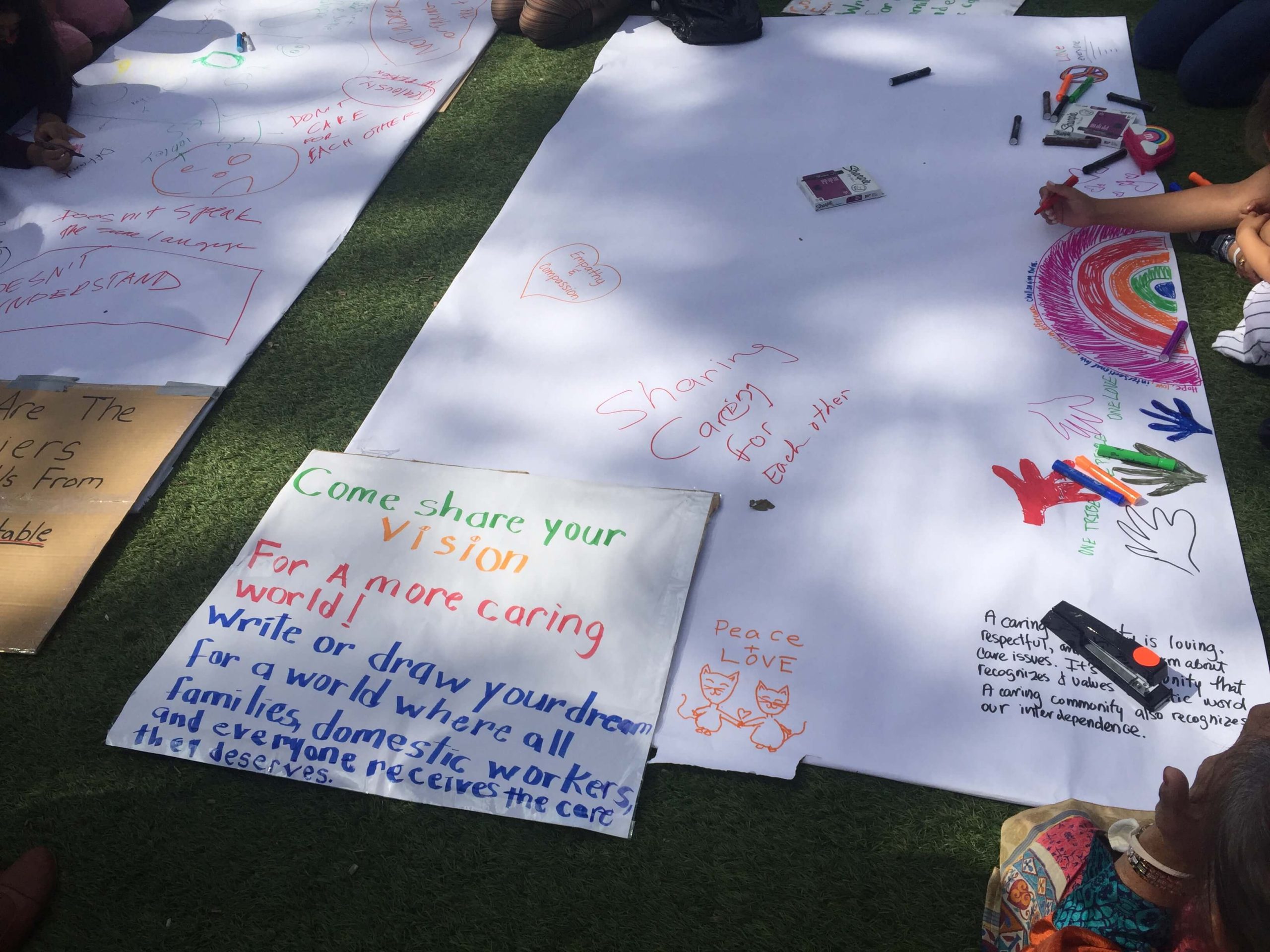On Sunday, September 26, at Washington Park in Park Slope, employers and domestic workers joined hands in an effort to improve jobs and conditions in the domestic care economy by urging the passage of Care Forward.
Care Forward is a local initiative that aims to raise, enforce and improve domestic worker rights.
[slideshow_deploy id=’14102′]
This event at Washington Park was organized by the Carroll Gardens Association (CGA) and Hand in Hand, who are working towards the enactments of these new rules.
The goal is to have this model of neighborhood based domestic worker enforcement where employers and caregivers come together spread across NYC and the country as a whole.
Kids had an opportunity to write messages and words to express their dreams for a world where domestic workers and everyone else can receive care that they deserve.
Domestic worker Meches Rosales-Maupin talked about the importance of Care Forward:
“I am here today and part of this Care Forward because I believe that we can have a better relationship between employers and employees, between parents and nannies and house cleaners.”
Later on, kids ran through a barriers of care sign. It was added that barriers stand in the way of creating a more caring world. Some words on the sign and that people added included ignorance, bad healthcare policies and misunderstanding.
This was their vision on how everyone can be treated with respect, which can lead to rights being improved.
A key element of Care Forward is conflict resolution, and the NY Peace Institute is a partner to help with this issue. There was a role playing exercise with a domestic worker and an employer where the employer came home late and they had to resolve the conflict.
A woman from the NYC Commission of Human Rights said that domestic workers are protected in the workplace under a new law: Intro 339B and can’t be discriminated against based on age, race or gender. Care Forward is looking to improve upon that, which in itself was a big step forward.
At this event during a beautiful late September day, there was a Peruvian dance group, an art station for kids, a nutrition area, a yoga station, a massage area where people were taught how to be more caring to their body and a piñata for kids.
Tatiana Bejar, lead organizer with Hand in Hand, explained that Intro 339 was introduced in 2018 and was just passed a month ago. Previous human rights law only protected four or more employees but since it applies to workplaces with four or fewer, domestic workers are now protected.
“It provided overtime pay, two days of vacation (paid time off) and three days of paid sick leave, but that is not enough,” Bejar said. “A few years ago, paid sick leave was extended so domestic workers have five days of sick leave for the whole year. I think domestic workers should have access to paid sick leave like any other workers.”
She talked about how it is important to respect the domestic workers and give them needed benefits.
“At my job, we have two weeks of paid sick leave,” Bejar said. “If the person gets sick for more days, employers should consider paying them. It is important to value the work of domestic workers. Domestic work has been historically excluded from labor protections and most of the sector is composed of immigrant women of color.”
Mariela Quintana is a member of Hand in Hand and a domestic worker employer. She thinks Care Forward will be the start of real change.
“This will set the framework and context for changes on a local and community level, which is what we are trying to do here,” Quintana said. “Change neighborhood standards to help educate employers and employees about raising the standards of care in the community and create a culture of care between workers and domestic worker employers.”
There was a similar model of community based standards in Seattle previously that they are taking guidance from, but that was not as grassroots and specific to the community as what they are doing.
It is about creating a greater understanding and culture around what is fair to domestic workers. Quintana said that benefits that could be added include improved paid time off, retirement benefits, standardized hours, best practices around overtime and healthcare.
“When you hire a nanny you don’t think about what goes beyond their salary,” Quintana said. “A domestic worker can work for decades and not have savings because they did not have a retirement account. That is crazy. As a domestic worker employer, I think we need to have greater responsibility for the people who care for our children.”
Assembly Member Jo Anne Simon attended in support of the Care Forward initiative.
Simon talked about how universal child care is important.
“Right now the laws for domestic workers are hopelessly bound up in policies from 1940,” she said “The need for universal childcare, if it is not apparent now, it never will be. I am looking forward to working with all of you going forward so we can create a caring economy, and our laws will help support that.”









